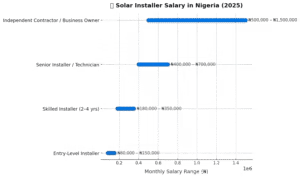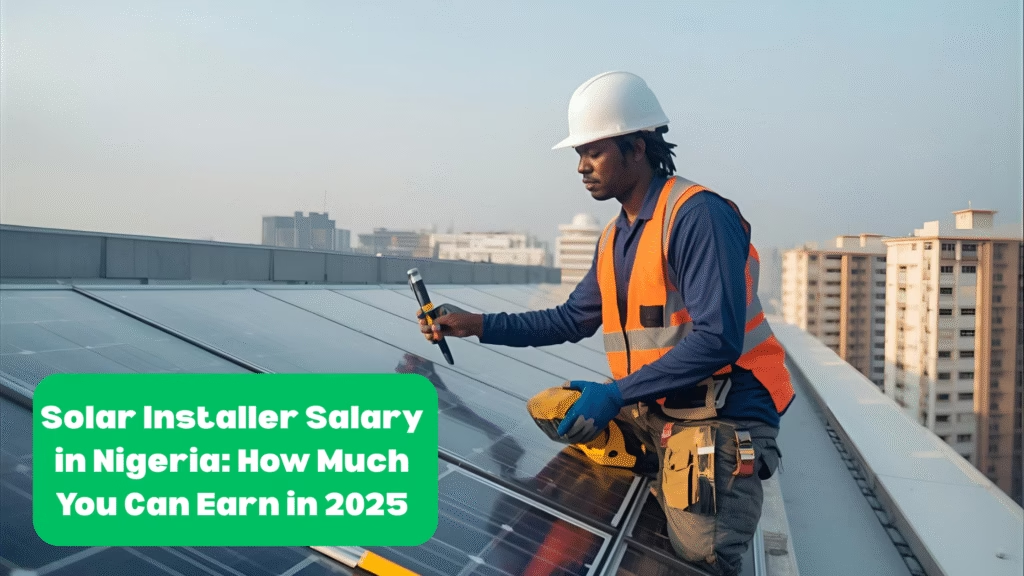Why Solar Installers Are in High Demand
Nigeria’s energy crisis has made solar power one of the fastest-growing industries in the country. From homes in Lagos looking to cut NEPA bills to businesses in Abuja running on renewable energy, demand for solar systems has never been higher.
Behind every installation is a skilled solar installer — and in 2025, this job is not only in demand but also well-paid.
If you’re thinking about joining the renewable energy industry, one of your biggest questions is:
👉 How much do solar installers really earn in Nigeria?
Let’s break it down.
Average Solar Installer Salary in Nigeria (2025)
Based on market research, industry surveys, and installer reports across major Nigerian cities, here’s what you can expect:
| Experience Level | Monthly Income Range (₦) | Notes |
| Entry-Level Installer | ₦80,000 – ₦150,000 | Works under supervision, assists in installations, usually after training/certification. |
| Skilled Installer (2–4 yrs exp.) | ₦180,000 – ₦350,000 | Can design small systems, lead installations for homes & shops, handles basic troubleshooting. |
| Senior Installer / Technician | ₦400,000 – ₦700,000 | Manages larger projects, trains juniors, works on offices, schools, and multi-inverter setups. |
| Independent Solar Contractor / Business Owner | ₦500,000 – ₦1.5M+ (per project) | Earnings depend on project size. Example: A 5kVA solar + battery system installation can pay ₦250,000+ in labor alone. |
Factors That Affect a Solar Installer’s Salary
- Location
- Installers in Lagos, Abuja, and Port Harcourt often earn more due to higher demand and bigger projects.
- Smaller towns may pay less but still offer steady work.
- Type of Project
- Residential jobs pay less than large office or industrial installations.
- Special skills like LiFePO₄ battery integration can boost earnings.
- Certification & Training
- Certified installers (from REAN, SolarInverter.ng Academy, or international bodies) often get higher pay and better job offers.
- Experience & Reputation
- A proven track record leads to word-of-mouth referrals, which can dramatically increase income.
- Business vs Employment
- Working for a company gives stable monthly pay.
- Running your own solar installation business offers higher income potential but also requires marketing and client management.

What Solar Installers Do (Job Scope)
A solar installer’s salary reflects the skills needed. Key tasks include:
- Designing solar systems for homes and businesses
- Installing inverters, batteries, and panels
- Performing wiring and safety checks
- Troubleshooting faults and carrying out maintenance
- Advising customers on energy savings and equipment choices
Real-World Example: Earnings from a 5kVA Solar Project
- Project type: 5kVA inverter + 6 batteries + 12 panels
- Labor charge: ₦250,000 – ₦400,000 (depending on city and complexity)
- Duration: 3–5 days work with a small team
- Takeaway: Skilled installers can earn in one project what many traditional jobs pay in a month.
Career Growth for Solar Installers in Nigeria
2025 and beyond looks bright for solar technicians because:
- The Federal Government and private investors are pushing renewable energy adoption.
- Businesses are shifting away from expensive diesel generators.
- Households want independence from NEPA bills and fuel price hikes.
This means more jobs, better pay, and steady career growth.
Conclusion
Becoming a solar installer in Nigeria in 2025 is not just a job — it’s a career with strong earning potential and long-term demand.
Whether you want stable employment with a renewable energy company or prefer to run your own solar business, salaries range from ₦80,000 for beginners to over ₦1.5M per project for advanced contractors.
If you’re ready to enter this field, the best step is to get proper training and certification. With skills in solar installation, you’ll always be in demand.



